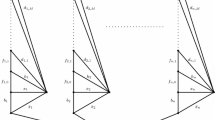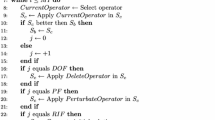Abstract
This paper combines social choice theory with mathematical optimization by applying various group decision concepts to a classical problem of combinatorial optimization, namely the famous traveling salesperson (salesman) problem. The aim of the latter is to find a tour through all vertices of a given graph along edges of minimal total cost. In this contribution we replace the measure of additive edge costs by the social acceptance of different edges and the resulting tours. In particular, for four different voting rules, the Borda rule, Approval voting, Plurality rule and Simple Majority rule, we will investigate the social acceptance of tours derived from global and local decisions. It will be shown that these two decision approaches can lead to widely varying results.
Similar content being viewed by others
References
Arrow KJ (1951) Social choice and individual values. Wiley, New York
Bentley JL (1992) Fast algorithms for geometric traveling salesman problems. ORSA J Comput 4:387–411
Brams SJ, Fishburn PC (1983) Approval voting. Birkhauser, Boston
Deitch R, Ladany SP (2000) The one-period bus touring problem: solved by an effective heuristic for the orienteering tour problem and improvement algorithm. Eur J Oper Res 127:69–77
Fishburn PC (1977) Condorcet social choice functions. SIAM J Appl Math 33:469–489
Fishburn PC (1992) Signed orders and power set extensions. J Econ Theory 56:1–19
Garey MR, Johnson DS (1979) Computers and intractability: a guide to the theory of NP-completeness. W.H. Freeman, San Francisco
Golden BL, Levy L, Vohra R (1987) The orienteering problem. Naval Res Logistics 34:307–318
Gutin G, Punnen AP (eds) (2002) The traveling salesman problem and its variations. Kluwer, Dordrecht
Jungnickel D (2005) Graphs, networks and algorithms, 2nd edn. Springer, Berlin Heidelberg New York
Klamler C (2004) The Dodgson ranking and its relation to Kemeny’s method and Slater’s rule. Soc Choice Welfare 23:91–102
Lawler EL, Lenstra JK, Rinnooy Kan AHG, Shmoys DB (1985) The traveling salesman problem. A guided tour of combinatorial optimization. Wiley, New York
Nurmi H (1987) Comparing voting systems. D. Reidel, Dordrecht
Nurmi H (1999) Voting paradoxes and how to deal with them. Springer, Berlin Heidelberg New York
Ong HL, Moore JB (1984) Worst-case analysis of two travelling salesman heuristics. Oper Res Lett 2:273–277
Perny P, Spanjaard O (2005) A preference-based approach to spanning trees and shortest paths problems. Eur J Oper Res 162:584–601
Ratliff TC (2001) A comparison of Dodgson’s method and Kemeny’s rule. Soc Choice Welfare 18:79–90
Ray P (1973) Independence of irrelevant alternatives. Econometrica 41:987–991
Rosenkrantz DJ, Stearns RE, Lewis PM (1977) An analysis of several heuristics for the traveling salesman problem. SIAM J Comput 6:563–581
Saari DG (1989) A dictionary for voting paradoxes. J Econ Theory 48:443–475
Saari DG (1990) The Borda dictionary. Soc Choice Welfare 7:279–317
Sen AK (1986) Social choice theory. In: Arrow KJ, Intriligator M (eds) Handbook of mathematical economics, vol III. Amsterdam, North Holland
Author information
Authors and Affiliations
Corresponding author
Rights and permissions
About this article
Cite this article
Klamler, C., Pferschy, U. The traveling group problem. Soc Choice Welfare 29, 429–452 (2007). https://doi.org/10.1007/s00355-006-0214-z
Received:
Accepted:
Published:
Issue Date:
DOI: https://doi.org/10.1007/s00355-006-0214-z




